Keywords: Assessment
There are more than 200 results, only the first 200 are displayed here.
-
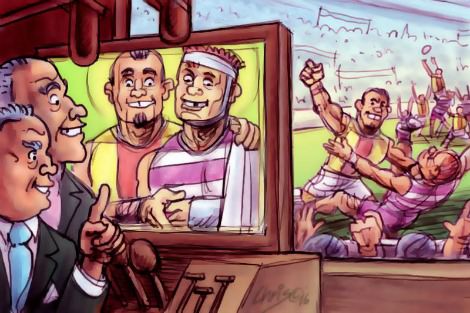
MEDIA
- Garry Westmore
- 02 May 2016
4 Comments
Arguably, as a society, Australia's tolerance for violence is waning, and both the AFL and the NRL have been proactive in diminishing the prevalence of deliberate and reckless violence that might endanger players' safety. Unfortunately, despite the AFL's desire to stamp out the more dangerous incidents, many televised football commentators are hindering the cause by making excuses for players, playing down the severity of their actions, and failing to condemn them.
READ MORE 
-
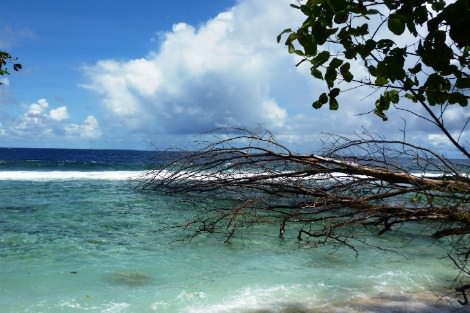
INTERNATIONAL
- Kerry Murphy
- 29 April 2016
9 Comments
This week we learnt that the human rights protection for asylum seekers in our former colony Papua New Guinea are more protected by the PNG constitution than they would be in Australia. The PNG government has quickly moved not to change the law and constitution, but to make arrangements to close the centre and ask Australia to take back the asylum seekers. Already PNG lawyers are talking about claims for compensation for the unlawful detention, and rightly so.
READ MORE 
-
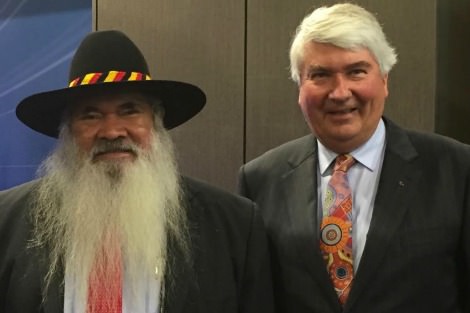
AUSTRALIA
- Frank Brennan
- 15 April 2016
21 Comments
The royal commission into Aboriginal deaths in custody, which signed off on its final reports 25 years ago this Friday, definitely improved the systems for supervision of persons in detention, reducing the risk of deaths in custody. It also led to better coronial procedures. But it failed to reverse Indigenous imprisonment rates and it did little to counter the underlying causes of Indigenous imprisonment. Back then, Patrick Dodson saw police as the main problem. Now, he thinks it's the legislators.
READ MORE 
-
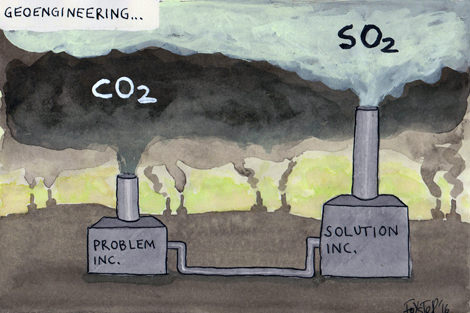
ENVIRONMENT
- Greg Foyster
- 14 April 2016
10 Comments
Geoengineering means intervening in the Earth's climate to offset global warming. It's hacking the planet on a monumental scale. The most widely studied proposal is spraying sulphate particles into the upper atmosphere to reflect sunlight, cooling the planet. The idea comes from huge volcanic eruptions, which can blast millions of tonnes of sulphur into the stratosphere, creating a kind of chemical sunshade. After decades of being taboo, this outlandish scheme is now being taken seriously.
READ MORE 
-
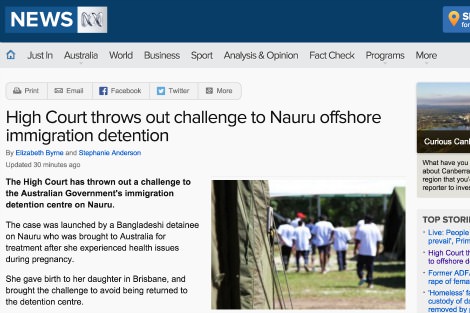
AUSTRALIA
- Frank Brennan
- 04 February 2016
24 Comments
Following Wednesday's High Court decision, the moral depravity of Australian funded offshore detention of asylum seekers, including children, is to continue. There is no joy to be found in our High Court applying a Constitution even more bereft of human rights protections than that of Nauru. It's time for our politicians to address the political and moral question: what purpose is actually served by sending this mum and her baby back to Nauru, when the boats have already stopped and will stay stop?
READ MORE 
-
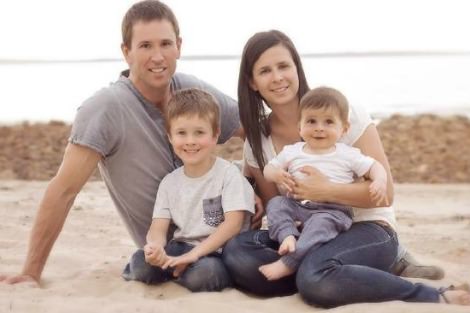
AUSTRALIA
- Lyn Bender
- 18 January 2016
18 Comments
In the early hours of a brand new year, two small boys had their lives extinguished by a purportedly depressed father. For me this event brought to mind two cases from a past life, when I was the manager of Melbourne Lifeline. One was a woman who disclosed that she had killed her two small children a decade earlier. In a second case, a belligerent suicidal man expressed rage towards his former partner, who was about to remarry. I asked pertinent questions. Would he harm his children? 'Yes.'
READ MORE 
-

ARTS AND CULTURE
- Tim Kroenert
- 10 December 2015
The End of the Tour is most compelling as a consideration of the relationship between journalist and subject, which is a strange kind of beast, glorified in the sprawling feature profiles of Rolling Stone and its ilk. At its best the relationship is marked by intimacy generated through dialogue, but at its worst or it is mutually exploitative. Scenes from this year's Amy Schumer press junket revealed how bad things can go when an interviewer thinks they are going to befriend their celebrity interviewee.
READ MORE 
-

AUSTRALIA
- Frank Brennan
- 10 December 2015
I first met this Tony on my regular visits here to Darwin when he was working at the North Australian Aboriginal Legal Aid Service and then when he set up the mediation services under the auspices of Anglicare. In later years I knew him when he was your Anti-Discrimination Commissioner. He was a quiet, considered, gentle, strong and principled man. On Human Rights Day, it is only fitting that I honour Tony by offering some reflections on the architecture for human rights in Australia, on the contemporary human rights controversies, and on the way forward for better protection of the human rights of Aborigines and asylum seekers, two marginalised groups who had a special claim on Tony's sympathies.
READ MORE
-

RELIGION
- Frank Brennan
- 04 December 2015
1 Comment
'Tonight, gathered here in the Southern Cross Club in the national capital, gathered as Eureka's children. We affirm that there is room for everyone under the Southern Cross. I hope you will return to Canberra carrying the Southern Cross flag when we proclaim the Australia Republic on 1 January 2020 which will be two elections after Australia last had a monarchist leader of a major political party. Tony Abbott is the last of his type. Whether the prime minister honoured to witness the proclamation is Malcolm Turnbull, Bill Shorten or another matters not.' Annual Dinner for Eureka's Children, Southern Cross Club, Canberra, 3 December 2015.
READ MORE
-

RELIGION
- Frank Brennan
- 03 December 2015
The consideration of medico-legal problems in the public square of a pluralistic democratic society keeping pace with profound technological change is often marked by simplistic assertions, precluding considerations of comprehensive world views, whether religious or philosophical. It is now commonplace for doctors to be told to leave their consciences at the door, as their patients are consumers and they are suppliers and of course the market decides. Debates about law and policy are often resolved with simplistic assertions about individual rights and autonomy, with little consideration for the public interest, the common good, and the doctor-patient relationship. Even conscience is said to be a matter for contracting out. This evening I ask whether there are more compelling ways to resolve medico-legal dilemmas, while conceding a limited role for law in determining the range of acceptable answers.
READ MORE
-

AUSTRALIA
- Jeff Sparrow
- 02 December 2015
7 Comments
For many years, historian Gary Foley has drawn attention to the racist past inscribed throughout the infrastructure of Melbourne University. Now, some staff and students are campaigning to rename facilities linked to particularly egregious individuals, such as the Richard Berry building, named after a leading eugenicist who stole the corpses of Indigenous people for research designed to prove the racial superiority of whites. While some accuse the campaigners of politically correct censorship, in fact the past has already been censored, and the campaigners are dragging it back into the light.
READ MORE 
-

RELIGION
- Frank Brennan
- 27 November 2015
2 Comments
'The crisis of child sexual abuse in our societies has required that our institutional procedures be more transparent and that we learn from the ways of the world in exercising power openly and justly. This means we have to restructure some of our church arrangements so that power is exercised accountably and transparently. All of us who have positions of influence and power in institutional churches need to be attentive to the voices of those who have suffered within our institutions.' 'Discerning the place for the prophetic voice and pragmatic cooperation of the churches in the great moral questions of the age', address to the Association of Practical Theology in Oceania conference, 26 November 2015.
READ MORE